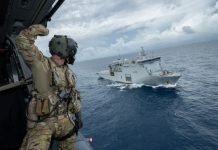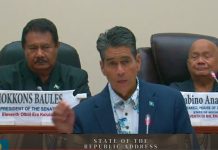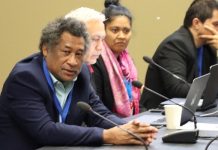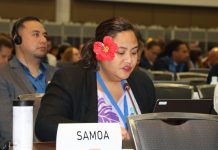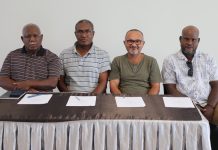The International Atomic Energy Agency’s (IAEA) director general Rafael Mariano Grossi is in Aotearoa advising the Government on the safety of treated wastewater disposal into the Pacific Ocean this year from its damaged Fukushima power plant.
The Government’s announcement that it supports the International Atomic Energy Agency amid a new IAEA report giving Japan the green light to release treated wastewater into the Pacific Ocean this summer may not go down well with New Zealand’s neighbours.
Aotearoa is a member of the Pacific Islands Forum, which has strongly condemned Tokyo’s plan saying PIF’s panel of independent scientific experts remained unconvinced by the IAEA’s findings.
The report, handed to the Japanese government last week by IAEA director general Raphael Grossi, revealed that Tokyo’s proposal had met international safety standards.
This means more than 1 million tonnes of the water from the damaged Fukushima power plant could find its way into the sea before Christmas.
Grossi met with Foreign Affairs Minister Nanaia Mahuta in Auckland on Monday afternoon as part of his “assurance tour” to the region to engage with government officials and critics and help reduce public concerns about food safety.
The meeting was closed to the media.
As Grossi assured Mahuta that Japan’s plan to release treated wastewater from its damaged Fukushima power plant was “safe”, concerns remained about the nuclear watchdog’s position on the issue.
Critics have accused the UN agency of “siding with Japan” which Grossi has denied.
The IAEA chief said he had visited local communities in Japan, and officials in neighbouring countries including South Korea to explain the discharge, planned over the next 30 years.
On March 11, 2011, an earthquake and tsunami destroyed the Fukushima Daiichi Nuclear Power Plant’s cooling systems, causing the meltdown of three reactors and the release of large amounts of radiation.
Water used to cool the damaged reactor cores, which remain highly radioactive, has since leaked but was collected and stored in tanks.
Now the tanks are full and need to be emptied, the Japanese government said, as a necessary step for the ongoing Fukushima cleanup and decommission.
Mahuta said discussions with Grossi covered the IAEA’s works in nuclear safety, security and safeguards, including the role the UN agency played in “promoting the peaceful and safe use of nuclear energy”.
“We also discussed its recent findings into the proposed Fukushima treated water release, noting its role as the international authority on nuclear safety matters,” the minister said in a statement.
“Aotearoa New Zealand has a proud and longstanding nuclear-free policy, and I reiterated New Zealand’s full confidence in the IAEA’s advice and commended their science-based approach.”
Mahuta said she drew Grossi’s attention to the Pacific’s traumatic experience with nuclear testing and “asked directly that meaningful engagement continue with the Pacific region on the proposed release”.
“New Zealand acutely understands the effects nuclear testing has had on our Pacific neighbours in the past, and we will continue to call for this matter to be dealt with through transparency and meaningful dialogue in particular with Pacific partners.
“I made clear our appreciation of the IAEA’s commitment to fulfilling its respective nuclear safety, security and safeguards mandates, and assured him of Aotearoa New Zealand’s firm and ongoing support for the agency’s vital work,” Mahuta said.
The IAEA report followed a two-year review, Grossi said adding that the approach to the discharge and associated activities by Tokyo Electric Power Company Holdings (TEPCO) – the company responsible for carrying out the release – Japan’s Nuclear Regulation Authority and the government were consistent with relevant international safety standards.
Grossi said the IAEA was committed to engaging with Japan not only before, but also during and after the treated water discharges occurred.
He said they would maintain an onsite presence at Fukushima and would publish data for the global community.
“Are you going to be discharging radioactive water on to the sea? Of course not. This water is cleansed through processes and filters, filtering,” he told Stuff.
“This process is monitored so that whatever goes out does not have any harmful effect on the environment, on water, the fish, the sediment, etc.
“Many people do not believe that this is going to be done in this way. Many believe that other ideas could have been explored. We consider that the plan is consistent, but it has to be done in a correct way,” Grossi said.
China is opposed to the plans, while South Korean opposition lawmakers have criticised the IAEA for approving Japan’s plans. They met with Grossi in a meeting in Seoul while protesters rallied outside.
Pacific civil society groups including NGOs and environmentalists claim Pacific leaders, including New Zealand and Australia, could be undermining the objectives of the South Pacific Nuclear Free Zone Treaty or Rarotonga Treaty established in 1986.
The group said some Pacific leaders were walking a fine line by not opposing the imminent release of radioactive wastewater by Japan.
The forum said it was not satisfied with the IAEA’s findings and called for the release to be delayed.
Forum secretary-general Henry Puna said questions on the process and data linked to the proposed discharge continued to be the focus of technical dialogue between PIF’s experts and the IAEA.
“There are questions on critical issues that relate to the protection of oceanic ecosystems, a thorough application of safety and environmental rules, including IAEA’s GSG-8, and how elementary rules, notably in relation to the ALARA principle, should be applied with reference to trans-boundary issues.
“ALARA is the guiding principle of radiation safety and stands for as low as reasonably achievable.
“The forum remains fully committed to addressing strong concerns for the significance of the potential threat of nuclear contamination to the health and security of the Blue Pacific, its people, and prospects.”
A forum delegation, led by PIF chair and Cook Islands Prime Minister Mark Brown, travelled to Japan in February to convey the Pacific’s concerns.
Puna said the Forum was assured Japan would “not harm the shared asset which is our Pacific Ocean”.
Grossi said the IAEA met with officials from the PIF Secretariat in Fiji in April.
Grossi and his delegation head to the Cook Islands on Tuesday.
SOURCE: STUFF NZ/PACNEWS


